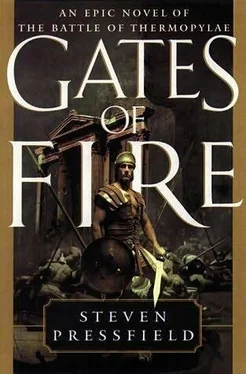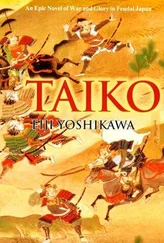Steven Pressfield - Gates of Fire - An Epic Novel of the Battle of Thermopylae
Здесь есть возможность читать онлайн «Steven Pressfield - Gates of Fire - An Epic Novel of the Battle of Thermopylae» весь текст электронной книги совершенно бесплатно (целиком полную версию без сокращений). В некоторых случаях можно слушать аудио, скачать через торрент в формате fb2 и присутствует краткое содержание. Жанр: Историческая проза, на английском языке. Описание произведения, (предисловие) а так же отзывы посетителей доступны на портале библиотеки ЛибКат.
- Название:Gates of Fire: An Epic Novel of the Battle of Thermopylae
- Автор:
- Жанр:
- Год:неизвестен
- ISBN:нет данных
- Рейтинг книги:3 / 5. Голосов: 1
-
Избранное:Добавить в избранное
- Отзывы:
-
Ваша оценка:
- 60
- 1
- 2
- 3
- 4
- 5
Gates of Fire: An Epic Novel of the Battle of Thermopylae: краткое содержание, описание и аннотация
Предлагаем к чтению аннотацию, описание, краткое содержание или предисловие (зависит от того, что написал сам автор книги «Gates of Fire: An Epic Novel of the Battle of Thermopylae»). Если вы не нашли необходимую информацию о книге — напишите в комментариях, мы постараемся отыскать её.
Gates of Fire: An Epic Novel of the Battle of Thermopylae — читать онлайн бесплатно полную книгу (весь текст) целиком
Ниже представлен текст книги, разбитый по страницам. Система сохранения места последней прочитанной страницы, позволяет с удобством читать онлайн бесплатно книгу «Gates of Fire: An Epic Novel of the Battle of Thermopylae», без необходимости каждый раз заново искать на чём Вы остановились. Поставьте закладку, и сможете в любой момент перейти на страницу, на которой закончили чтение.
Интервал:
Закладка:
Now, seven hours into the slaughter, all such observance of piety had fled. Men stared with hollow eyes upon the riven plain. Across this farmer's field of death lay sown such a crop of corpses and shields, hacked-up armor and shattered weapons, that the mind could not assimilate its scale nor the senses give it compass. The wounded, in numbers uncountable, groaned and cried out, writhing amid piles of limbs and severed body parts so intertangled one could not distinguish individual men, but the whole seemed a Gorgon-like beast of ten thousand limbs, some ghastly monster spawned by the cloven earth and now draining itself, fluid by fluid, back into that chthonic cleft which had given it birth. Along the face of the mountain the stone glistened scarlet to the height of a man's knee.
The faces of the allied warriors had by this hour clotted into featureless masks of death. Blank eyes stared from sunken sockets as if the divine force, the daimon, had been extinguished like a lamp, replaced by a weariness beyond description, a stare without effect, the hollow gaze of hell itself. I turned to Alexandros; he looked fifty years old. In the mirror of his eyes I beheld my own face and could no longer recognize it.
A temper toward the enemy now arose which had not been present before. This was not hatred but rather a refusal to reckon quarter. A reign of savagery began. Acts of barbarity which had been hitherto unthinkable now presented themselves to the mind and were embraced without a quibble. The theater of war, the stink and spectacle of carnage on such a scale, had so overwhelmed the senses with horror that the mind had grown numb and insensate. With perverse wit, it actually sought these and sought to intensify them.
All knew that the next attack would be the day's last; nightfall's curtain would adjourn the slaughter until tomorrow. It was also clear that whichever force the foe next threw into the line would be his finest, the cream saved for this hour when the Hellenes labored in exhaustion and stood the likeliest chance of being overthrown by fresh troops. Leoni-das, who had not slept now in more than forty hours, yet prowled the lines of defenders, assembling each allied unit and addressing it in person. Remember, brothers: the final fight is everything. All we have achieved so far this day is lost if we do not prevail now, at the end. Fight as you have never fought before.
In the intervals between the first three assaults, each warrior readying for the next engagement had striven to scour clean the face of his shield and helmet, to present again to the foe the gleaming terror-inspiring surface of bronze. As the threshing mill of murder progressed throughout the day, however, this housekeeping became honored increasingly in the breach, as each knurl and inlay on the shield acquired a grisly encrustment of blood and dirt, mud and excrement, fragments of tissue, flesh, hair and gore of every description. Besides, the men were too tired. They didn't care anymore. Now Dithyrambos, the Thespian captain, sought to make a virtue of necessity. He ordered his men to cease from burnishing their shields, and instead to paint and streak them, and the men's own body armor, with yet more blood and gore.
This Dithyrambos, by trade an architect and by no means a professional soldier, had already distinguished himself with such magnificent courage throughout the day that the prize of valor, it was a foregone conclusion, would be his by acclamation. His gallantry had elevated him second only to Leoni-das in prestige among the men. Dithyrambos now, stationing himself in the open in full view of all the men, proceeded to smear his own shield, which was already nearly black with dried blood, with yet more gore and guts and fresh dripping fluid. The allies in line, the Thespians, Tegeates and Man-tineans, ghoulishly followed suit. The Spartans alone abstained, not out of delicacy or decorum, but simply in obedience to their own laws of campaign, which command them to adhere without alteration to their customary disciplines and practices of arms.
Dithyrambos now ordered the squires and servants to hold their places, to refrain from sweeping the advance ground of enemy bodies. Instead, he sent his own men out onto the arena with orders to heap the corpses in display in the most ghoulish manner possible, so as to present to the next wave of the foe, whose marshaling trumpets could already be heard around the shoulder of the Narrows, the most ghastly and terrifying spectacle possible.
Brothers and allies, my own beautiful dogs from hell! he addressed the warriors, striding helmetless before the lines, his voice carrying powerfully even to those upon the Wall and marshaling in the ready-ground behind. This next wave will be the day's last. Cinch up your balls, men, for one final surpassing effort. The enemy believes us exhausted and anticipates dispatching us to the underworld beneath his onslaught of fresh, rested troops. What he doesn't know is we're already there. We crossed the line hours ago. He gestured to the Narrows and its carpeting of horror. We stand already in hell. It is our home!
A cheer rose from the line, overtopped by wild profane shouts and whoops of hellish laughter.
Remember, men, Dithyrambos' voice rose yet more powerfully, that this next wave of Asiatic ass-fuckers has not seen us yet. Consider what they have seen. They know only that three of their mightiest nations have advanced against us wearing their testicles and come back without them.
And I promise you: they are not fresh. They've been sitting on their dogblossoms all day, watching their allies carried and dragged back, hacked to pieces by us. Believe me, their imaginations have not been idle. Each man has conjured his own head cleaved at the neck, his own guts spilling into the dirt and his own cock and balls brandished before him on the point of a Greek spear! We're not the ones who are worn out, they are!
Fresh shouting and tumult erupted from the allies, save the Spartans, while the Thespians on the field continued their butchery. I glanced to Dienekes, who observed this all with a grim twist upon his features.
By the gods, he declared, it's getting ugly out there.
We could see the Spartan Knights, led by Polynikes and Doreion, taking their stations about Leonidas in the forefront of the line. Now a lookout came running back in from the forwardmost post. This was Hound, the Spartan Skirite; he sprinted straight to Leonidas and made his report.
The news spread swiftly: the next wave would be Xerxes' own household guard, the Immortals.
The Greeks knew that these comprised His Majesty's picked champions, the flower of Persian nobility, princes schooled from birth to draw the bow and speak the truth.
More to the point, their numbers were ten thousand, while the Greeks had fewer than three thousand still fit to fight. The Immortals, all knew, derived their name from the custom of the Persians that replaced at once each royal guardsman who died or retired, thus keeping the number of Xerxes' finest always at ten thousand.
This corps of champions now advanced into view at the neck of the Narrows. They wore not helmets, but tiaras, soft felt caps topped with skull-crowns of metal glistening like gold. These half-helmets possessed no cover for the ears, neck or jaw and left the face and throat entirely exposed. The warriors wore earrings; some of their faces were painted with eye kohl and rouged like women. Nonetheless they were magnificent specimens, selected it seemed not merely, as the Hellenes well knew, for valor and nobility of family but for height and handsomeness of person as well. Each man looked more dashing than the fellow at his shoulder. They wore sleeved tunics of silk, purple rimmed with scarlet, protected by a sleeveless coat of mail in the shape of fish scales, and trousers atop calf-height doeskin boots. Their weapons were the bow, belt scimitar and short Persian lance, and their shields, like the Medes' and the Cissians', were shoulder-togroiners made of wicker. Most astonishing of all, however, was the quantity of gold ornament each Immortal wore upon his person in the form of brooches and bracelets, amulets and adornments. Their commander, Hydarnes, advanced to the fore, the only mounted antagonist the allies had so far beheld. His tiara was peaked like a monarch's crown and his eyes shone brilliantly beneath kohled lashes. His horse was spooking, refusing to advance across the charnel sward of corpses. The foe drew up in ranks on the flat beyond the Narrows. Their discipline was impeccable. They were spotless.
Читать дальшеИнтервал:
Закладка:
Похожие книги на «Gates of Fire: An Epic Novel of the Battle of Thermopylae»
Представляем Вашему вниманию похожие книги на «Gates of Fire: An Epic Novel of the Battle of Thermopylae» списком для выбора. Мы отобрали схожую по названию и смыслу литературу в надежде предоставить читателям больше вариантов отыскать новые, интересные, ещё непрочитанные произведения.
Обсуждение, отзывы о книге «Gates of Fire: An Epic Novel of the Battle of Thermopylae» и просто собственные мнения читателей. Оставьте ваши комментарии, напишите, что Вы думаете о произведении, его смысле или главных героях. Укажите что конкретно понравилось, а что нет, и почему Вы так считаете.












